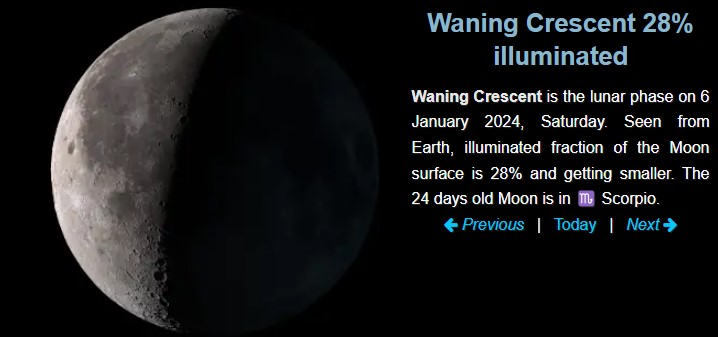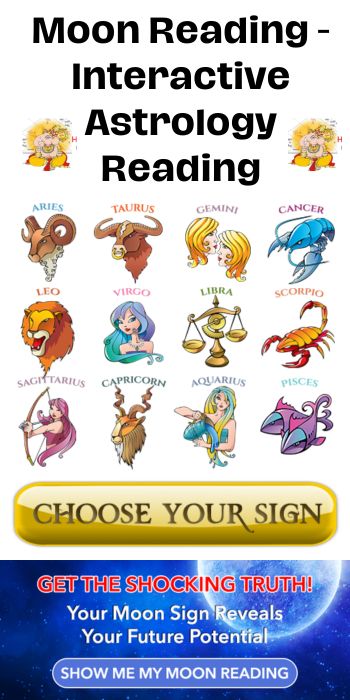Moon phase January 6 2024: Today the Moon is in its waning crescent phase. This phase is best seen just before sunrise in the western sky. At this point, the light of the Moon decreases each day until the new moon. During this part of the lunar cycle, the Moon approaches the Sun as seen from the Earth, and the night side of the Moon faces the Earth, and only a small edge of the Moon is illuminated.
This can also be a good time to see features on the Moon’s surface. At the edge of the meeting between the illuminated part and the dark side, craters and mountains cast long shadows, making them easy to observe with a telescope or binoculars. Visit the January 2024 Moon Phases Calendar to see all the daily moon phases for this month.
Moon Phase January 6 2024
The waning crescent phase On January 6, the illumination of the waning crescent moon is 28%. This is the percentage of the month lit by the Sun. Lighting is constantly changing and can vary up to 10% per day.
On January 6, the Moon is 24.32 days old. This indicates how many days have passed since the last new moon. The Moon takes 29.53 days to orbit the Earth and go through all 8 lunar phases. Moon phase for Saturday, January 6, 2024 at 12:00 UTC Lower crescent 28% Illumination Wanning Crescent is the phase of the moon on January 6, 2024 , Saturday.
Seen from Earth, the illuminated part of the Moon’s surface is 28% and decreasing. The 2 -day Moon is in ♏ Scorpio.
Phase Details For January 6 2024
Phase: Waning Crescent
Illumination: 28%
Moon Age: 24.32 days
Angle: 0.51
Moon Distance: 393,347.36 km
Sun Angle: 0.54
Sun Distance: 147,101,015.13 km
Moon phase on Saturday January 6, 2024
The current phase of the Moon on January 6, 2024 is the waning crescent. Today the moon is 2 .11 days old and 31.71% is illuminated at a declination of -26 .13 °. The estimated distance from the Earth to the Moon is 392,930.87 km and the Moon Sign is Scorpio.
The phase of the moon on January 6, 2024 is the phase of the waning crescent moon. This is the phase where the Moon is less than 50% illuminated but has not yet reached 0% illumination (which would be a New Moon). During this part of the Moon’s cycle, it approaches the Sun as seen from Earth, and the night side of the Moon faces Earth and the waning thin crescent is illuminated.
The waning (waning) crescent moon rises around midnight, passes the meridian after sunrise, before setting after noon. This phase is best seen 1-2 hours before sunrise and is a good time to see features on the Moon’s surface. Moon craters and mountains casting long shadows can be seen along the illuminated crescent.
The Waxing Gibbous phase, like all phases of the Moon, lasts a little over 7 days. The actual length varies due to the elliptical orbit of the Moon. During this waxing gibbous phase, the Moon rises in the east in the mid to late afternoon and is high in the eastern sky at sunset.
Assuming a clear night, the waxing moon will be visible for most of the night before sunset just before sunrise. Fun fact: the lit side of the waning crescent always faces east, toward the sunrise.
Related:



Leave a Reply